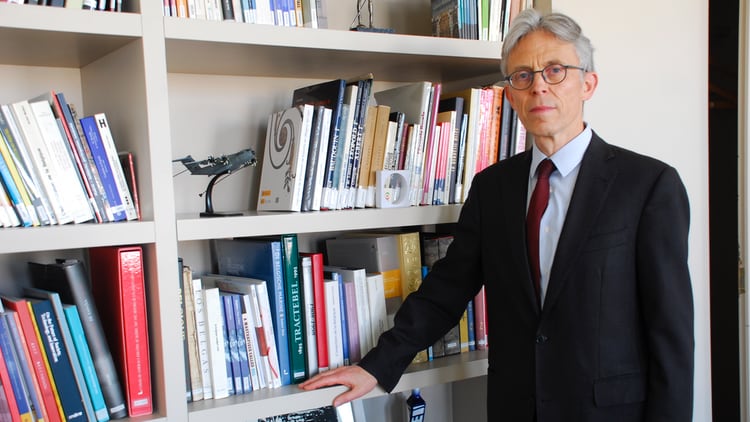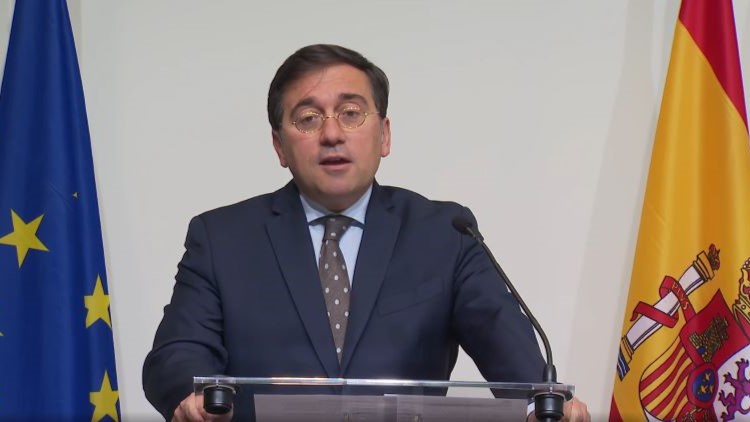Geert Cockx
Ambassador of Belgium in Spain
Alberto Rubio
Halfway through the six months of the Belgian Presidency of the European Union, it is a good time to review the progress made and plans for the future. For the Belgian Ambassador to Spain, Geert Cockx, notable achievements have been made at what he describes as a “crucial” moment in the run-up to the European elections in June.
What is your assessment of the first half of your Presidency of the European Council?
Let me start with a nuance: the role of a Presidency is above all to seek agreements in order to move dossiers forward. It is an honest broker. Having said that, we are at the halfway point of our Presidency, during which we will have a unique moment, the European Parliament elections in June, which are crucial. That means that we have a two-part presidency. The first, in which we have to close the legislative cycle, as the European Parliament closes its doors at the end of April, and to make progress we needed to have agreements between Parliament and the Council by 15 March.
We have had the good fortune to follow the Spanish Presidency, which was very successful on very important issues such as the reform of the electricity market or the migration and asylum pact, among others. I always say that, in reality, we have not had two presidencies but a very long one, lasting 12 months, with the shared responsibility of finalising the maximum possible number of dossiers between the Council, Parliament and the Commission. And we can say that in the last three months we have reached agreements on 67 dossiers.
That is a remarkable achievement.
I think that is quite good. I would say that, together with Spain, we have achieved a lot. But the important thing about this is that it was necessary to show before the elections that the European Union works and that it has answers to citizens’ concerns, as His Majesty King Philippe of the Belgians said in the European Parliament last week.
As I was saying, that is the first part, the legislative part. Now comes the part of the future, as the King also said before the Parliament. In the coming months we will be thinking fundamentally about the future of the Union, on the basis of our strategic agenda, to set the priorities for the next legislative cycle and to prepare for enlargement. If we are to become 35 Member States, we will have to adapt in order not to lose our effectiveness.
Enlarging the Union means strengthening it. As our Prime Minister has said, we have to do it in a way that strengthens us and does not weaken us. There are issues that we need to review such as the budget, governance, decision-making… In the words of our Foreign Minister, it is about creating a stronger, more efficient Europe, at the service of its citizens and always united.
Belgium is focusing its Presidency on six axes – the rule of law, competitiveness, ecological transition, the social and health agenda, protecting people and borders, and global Europe. Do any of these objectives have a higher priority?
They are all important and are reflected in our motto, “Protect, Strengthen, Prepare”, which reflects the times we live in, with multiple crises, wars and economic, social and climate challenges. So it is about protecting our citizens, our values and our unity; strengthening our economy, our competitiveness and social and health Europe; and finally preparing for the future, with the digital and ecological transitions. All this translates into our six sets of priorities. But it is very difficult to say which one is a priority. It also depends on the dossiers that remain to be closed.
I would say, however, that the first group – the rule of law, democracy and unity’ – remains a high priority for our presidency, as it was for the previous one. We are talking about safeguarding democratic principles, the rule of law and fundamental rights. In this regard, we adopted the Regulation on Freedom of the Media, which was a pending dossier. In the competitiveness cluster, I would like to highlight the report by former Italian Prime Minister Enrico Letta on the internal market. This report, commissioned by the Spanish and Belgian presidencies, was published on 16 April. Belgium has also committed itself to strengthening the EU’s industrial future.
What is the aim of this?
When we talk about industry, it is about strengthening our industrial resilience in the EU. For example with the Key Raw Materials Lay, so that we don’t have another dependency like the one we have on fossil fuels. We want to diversify the suppliers of raw materials and, at the same time, make sure we have the capacity to source them on our own territory, for example lithium in Spain. Another important achievement is the Zero Net Emissions Industry Act, which aims to make a green transition by relying also on our industry.
Despite the successive crises we have gone through, both past and present, can it be said that Europe has regained a certain stability?
I think so. If you look at Europe’s achievements after the financial crisis, after the pandemic and after the war in Ukraine, you will see that the Union was able to work together to overcome them. During the pandemic, we agreed on the joint purchase of vaccines. As for the war against Ukraine, we supported it jointly from the beginning and we continue to do so: in January we agreed to continue to support Ukraine in all areas, whether in terms of refugees, our military support or our commitment to its reconstruction. Five years ago, this would have been unthinkable, especially in the military field.
Do we Europeans need to be clear that, independently of NATO, we must assume our own defence? Has the war in Ukraine made us realise this need?
The war in Ukraine is making us aware of this, and under the Spanish Presidency we have already reached several agreements on defence matters, such as joint arms purchases. Now the Commission has just published the Defence Industrial Strategy for a more European defence in the long term.
Does this imply greater integration of the defence industry in different countries?
I think it is more than just cooperation. The idea is to cooperate on concrete projects by companies from several member states and to have an integrated defence market. What we always say is that we don’t always have to spend more, but spend better. We can avoid duplication between member states. And with an integrated market it would be easier to have more efficient spending than we have now.
And also may reduce our external dependence?
Yes, it is also about achieving that strategic autonomy. Not only in terms of energy, but also in other areas such as defence.
Do you think there is a real risk that Russia will be able to influence the upcoming European elections? How can this be avoided?
We know that there are and will be attempts by Russia to interfere, as High Representative Josep Borrell said, and we have to defend ourselves against their intentions to interfere in our elections. The Strategic Compass we adopted two years ago has an action plan to strengthen the EU’s security and defence policy between now and 2030. And within that Strategic Compass we have a ‘toolbox’ to fight manipulation and foreign interference.
But will this ‘toolbox’ work? So far we have seen that Russian ‘hackers’ can be quite effective.
I believe so. Moreover, both the work of member states’ intelligence services and the work of the judiciary will support us in preventing and counteracting such interference.
Given that MEPs enjoy immunity, how can cases such as that of Latvian MEP Tatjana Ždanoka, who is suspected of collaborating with the Kremlin’s secret services, be fought?
We have a recent example of what can be done. I am referring to the case that the press called ‘Qatargate’, in which Members of the European Parliament were involved. There we have seen that the Parliament can act by suspending MEPs, dismissing them or even lifting their immunity. They have quite a lot of possibilities to act against these activities. And we also have the example of the Belgian Public Prosecutor’s Office, which last week opened an investigation into alleged payments from Russia to MEPs. There are possibilities to act against these activities.
Do you think that we Europeans sometimes fail to appreciate the “paradise” island we live in, compared to the rest of a rather turbulent world?
Without pronouncing on the rest of the world, what I am sure of is that the European Union is a success from its beginnings, for the achievements we have had in terms of peace, prosperity, promotion of our values. And we have seen it with the covid crisis, with Ukraine… Of course there are things we can improve, but the Union works. If we look back just 15 years, the progress we have made since then is impressive.
In terms of our bilateral relations, is there anything new?
Our relations remain excellent. We have a shared history, culture and values. I can advance that in 2025 Spain will be the guest country at Europalia, an international art festival that we hold in Belgium every two years. It is the first time that a country will repeat participation. The 1985 Europalia Spain edition was already a great success.






